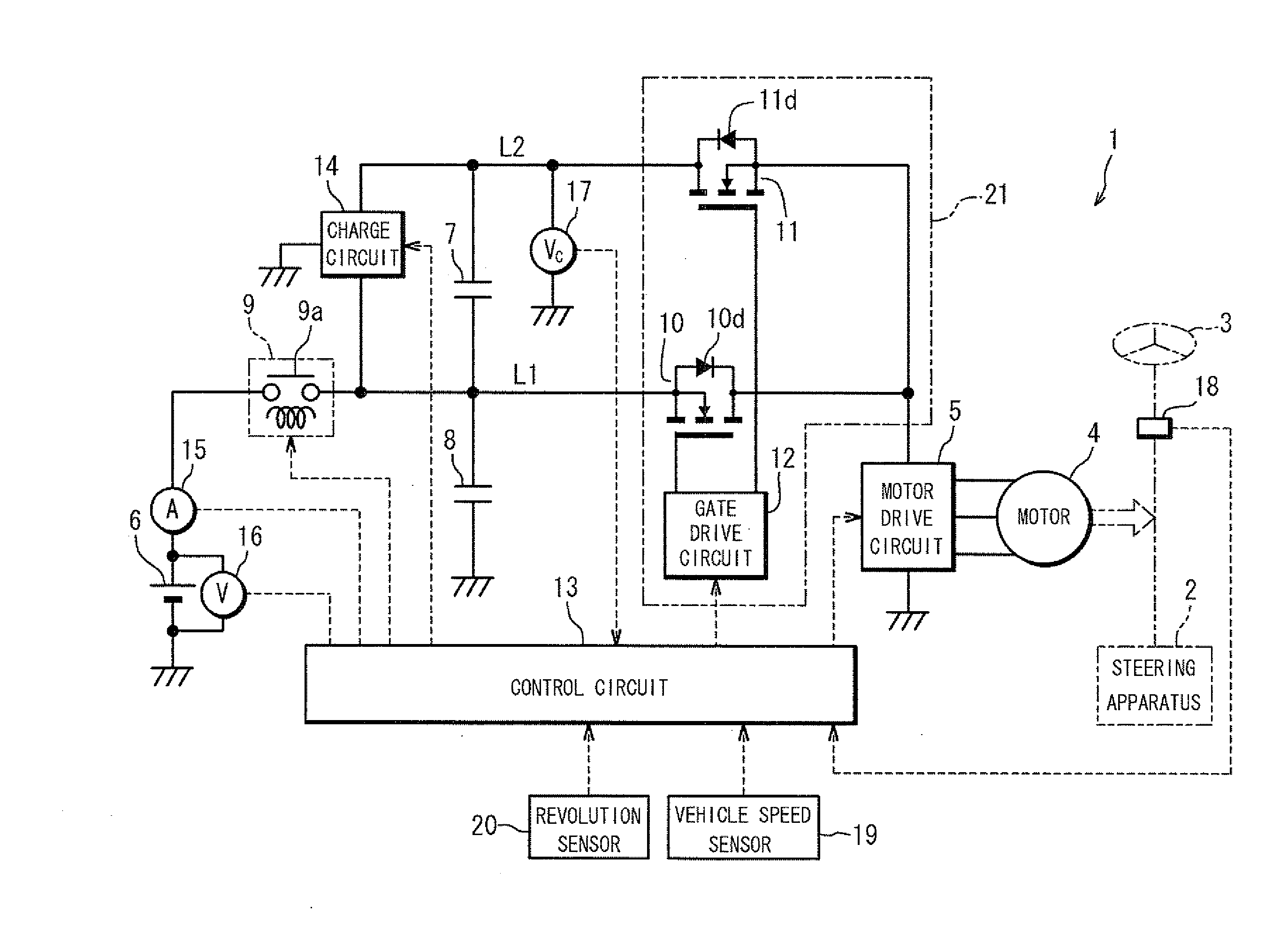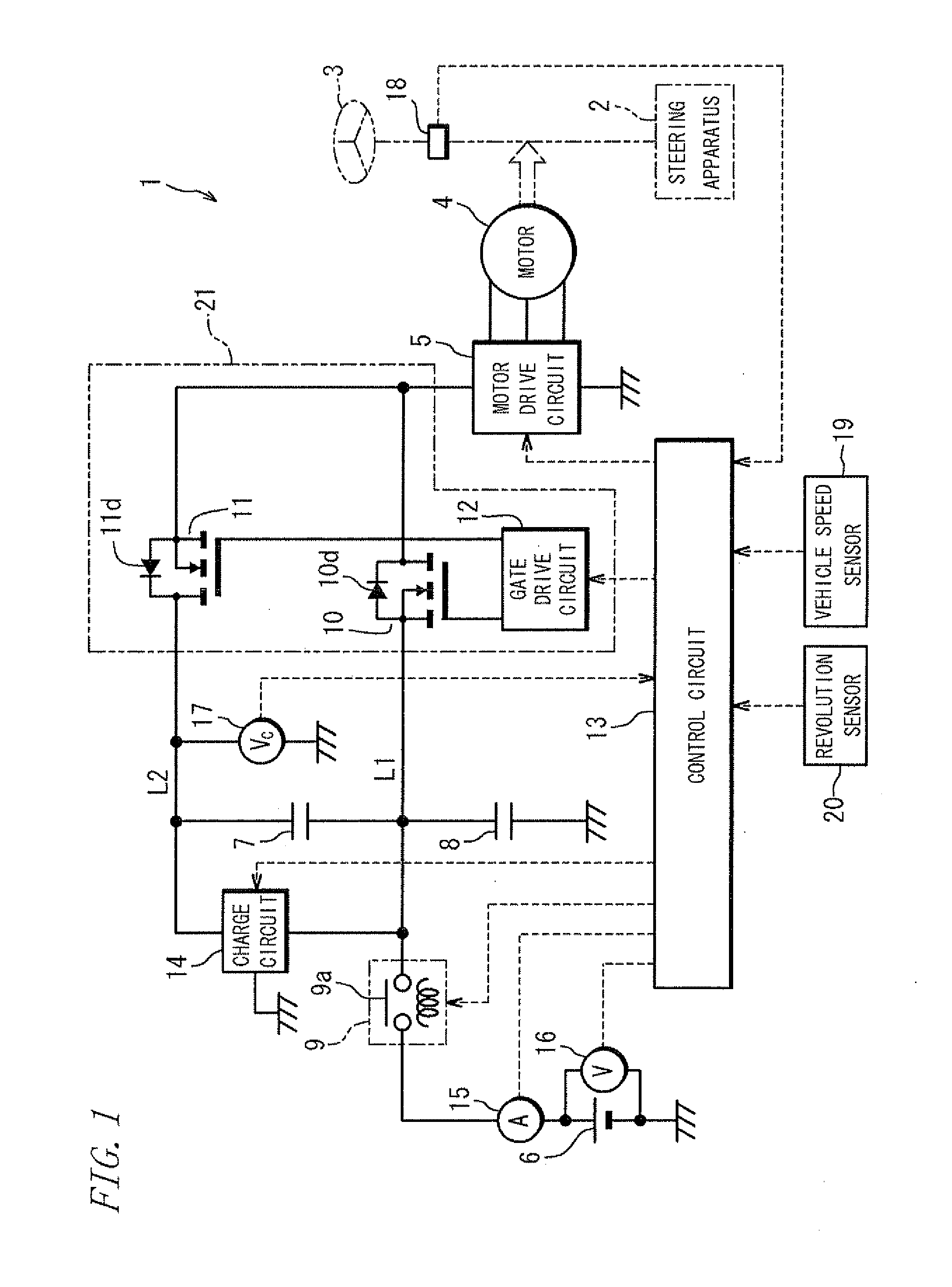Electric power steering apparatus
a technology of electric power steering and steering load, which is applied in the direction of steering initiation, instruments, vessel construction, etc., can solve the problems of sudden increase in steering load, sudden loss of steering assist force, etc., and achieve the effect of effectively utilizing available stored energy and preventing a sudden fall of steering assist for
- Summary
- Abstract
- Description
- Claims
- Application Information
AI Technical Summary
Benefits of technology
Problems solved by technology
Method used
Image
Examples
first embodiment
[0021]FIG. 1 is a circuit diagram principally showing an electric circuit of a general arrangement of an electric power steering apparatus 1 according to the invention. Referring to the figure, a steering apparatus 2 is driven by a steering torque applied by a driver to a steering wheel 3 and a steering assist force generated by a motor 4. The motor 4 is a three-phase brushless motor which is driven by a motor drive circuit 5. The motor drive circuit 5 is supplied with voltage from a battery 6 or from a power source including an auxiliary power supply 7 connected in series with the battery 6. The auxiliary power supply 7 comprises an electric double-layer capacitor. Another auxiliary power supply 8 is in parallel connection with the battery 6 so as to serve as a backup power source and is also in serial connection with the auxiliary power supply 7. The auxiliary power supply 8 also comprises an electric double-layer capacitor.
[0022]The voltage of the battery 6 is conducted to the mo...
second embodiment
[0044]FIG. 5(a) is a graph showing the time-varying upper limit of supply power according to the FIG. 5(b) is a graph showing how the supply power (solid line), with restriction of the upper limit, decreases during the steering operation.
[0045]According to the control of the second embodiment, the control circuit 13 does not start the output decreasing control at the mere detection of the breakdown of the battery 6. The control circuit 13 starts the output decreasing control only after the application of steering torque of at least the predetermined value, which follows the detection of battery breakdown. In other words, the steering system does not encounter a phenomenon after the battery breakdown that the upper limit of supply power (steering assist force) is already decreased although no steering operation was done. When the driver performs the first steering operation after the battery breakdown, therefore, the steering system can prevent the driver from experiencing the feeli...
third embodiment
[0047]FIG. 6 is a circuit diagram principally showing an electric circuit of a general arrangement of an electric power steering apparatus according to the invention. This circuit diagram differs from that of FIG. 1 in that an output signal from a sensor 22 for detecting the revolutions of the motor 4 is applied to the control circuit 13. Except for this, this circuit is configured the same way as that of FIG. 1. The sensor 22 may employ a revolving angular sensor intrinsically provided in the brushless motor.
[0048]FIG. 7 is a flow chart showing the steps of a control operation of the electric power steering apparatus 1 according to the third embodiment. Referring to the figure, the control circuit 13 repeats the normal control till the breakdown (failure) of the battery 6 is detected (Steps S1, S2). In a case where the breakdown of the battery 6 is detected by the control circuit 13 in Step S2, the control circuit 13 first determines whether a voltage Vc detected by the voltage det...
PUM
 Login to View More
Login to View More Abstract
Description
Claims
Application Information
 Login to View More
Login to View More - R&D
- Intellectual Property
- Life Sciences
- Materials
- Tech Scout
- Unparalleled Data Quality
- Higher Quality Content
- 60% Fewer Hallucinations
Browse by: Latest US Patents, China's latest patents, Technical Efficacy Thesaurus, Application Domain, Technology Topic, Popular Technical Reports.
© 2025 PatSnap. All rights reserved.Legal|Privacy policy|Modern Slavery Act Transparency Statement|Sitemap|About US| Contact US: help@patsnap.com



